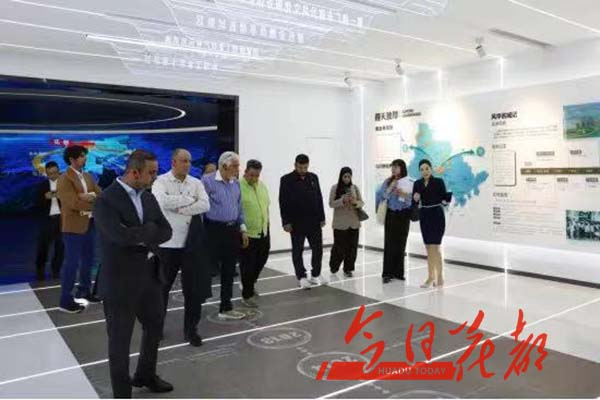Political and Economic Delegation of GCC Countries Visited Huadu to Explore New Cooperation Opportunities

A delegation of representatives from the United Arab Emirates, Saudi Arabia, Kuwait, Oman and other member countries of Gulf Cooperation Council, accompanied by relevant leaders of the International Department of the Central Committee of CPC, the Office of the Foreign Affairs Commission of CPC Guangdong Committee, and the Investment Promotion Bureau of the Department of Commerce of Guangdong Province, paid a visit to Huadu, where they had in-depth exchanges and discussions and explored together the opportunities for investment in Huadu with relevant officials of CPC Huadu District Committee and the District government, as well as heads of investment promotion departments.
The delegation visited the Huadu No. 2 plant of Dongfeng Nissan Passenger Vehicle Co., Ltd., an important automobile brand in the world, and Guoguang Electric Company Ltd, a leading enterprise in China's electroacoustic industry; they learned in detail about the development of the automobile industry and intelligent equipment industry in Huadu District, and highly praised the development and innovation results of Huadu's advanced manufacturing. The delegation then visited the Huadu City Exhibition Hall; there they learned about Huadu from the dimensions of history, culture, planning, and industry.
The Gulf Cooperation Council (GCC) is the most important political and economic organization in the Gulf region. Founded in May 1981 and headquartered in Riyadh, Saudi Arabia, the GCC has Saudi Arabia, the United Arab Emirates, Qatar, Kuwait, Oman and Bahrain as its full members. Since its establishment, members of the GCC have been actively promoting the process of economic integration by giving full play to the advantages of shared language and religion and similar economic structure.
As of the first half of 2024, the GCC's foreign exchange reserves surpassed $804.1 billion, ranking fifth in the world; its non-oil economic growth reached 3.8%; and member states such as the UAE and Saudi Arabia have achieved leapfrog growth in areas like fintech and renewable energy through economic diversification strategies. With its member states having an economic growth of 4.2% in 2025, as predicted by the World Bank, GCC has become a core springboard for Chinese companies entering the Middle East market.
China and the GCC countries have a history of friendly exchanges for nearly 2,000 years. Both belong to the oriental civilization, sharing similar cultural values and the peoples know each other well. Tied by the "Ancient Silk Road" the two sides have written a splendid chapter of unity, mutual assistance, and win-win cooperation. As a starting point of the Maritime Silk Road, Guangzhou has develop by leaps and bounds bilateral cooperation with Gulf countries under the "Belt and Road" initiative, and there are promising prospects and profound potential in the field of economic and trade cooperation.
Huadu is the only large-scale comprehensive air-rail dual hub in the Guangdong-Hong Kong-Macao Greater Bay Area, enjoys a three-dimensional transportation system of "air, rail, sea and land" that connects the world, and is praised as "China's automobile capital", "China's beauty capital", "China's leather goods capital" and "China's audio capital". The District is now accelerating the development of new quality productivity represented by "new intelligent manufacturing, new services and new business formats". Baiyun International Airport now has about 10 flights a day bound for the Middle East; and the airport will become the world's largest single airport after the completion of the third phase of expansion this year, bringing new opportunities and expanding new room for cooperation between Huadu and GCC countries. The two sides will take this delegation's visit as an opportunity to further strengthen friendly exchanges, and promote interaction in the fields of new energy, automobile exports, and new generation information technology, for a new chapter of cooperation.
